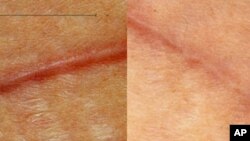If you've had major surgery - or know someone who has - you may know firsthand that a trip to the operating room can leave a lifelong souvenir... a scar. Now, researchers in California have developed a new kind of bandage that they've shown reduces scar formation.
Stanford University plastic surgeon Geoffrey Gurtner admits that, despite his skill, some of his patients end up with unattractive scars.
"Even doing the best I can," he admits, "patients still end up with scars, and it's somewhat unpredictable. Some people have very bad scars, and some people have better scars. So there hasn't been a simple way to really get the scar as good as it possibly can be."
One reason scars form is that skin movement around the surgical incision tugs at the new skin tissue that is growing as the wound heals. This mechanical stress causes scar tissue to thicken and spread out. The result can be a raised, rope-like scar.
So Gurtner and his colleagues - including both surgical and materials experts - developed a kind of bandage that would isolate the wound from the movement of the skin around it.
The bandage covers the incision, held on by adhesive strips that run parallel to the wound. Gurtner explains that they transfer the stress of movement away from where the skin is growing back together.
"If you're moving around or doing jumping jacks, actually all the mechanical forces go to the skin, and then they go over the incision through this elastomer and go back on to the other side," he said. "So that the area underneath the bandage doesn't feel any mechanical forces."
Tests on laboratory animals and a very small number of humans volunteers show reduced scarring compared with ordinary bandages.
Gurtner is a plastic surgeon, but he said it's not just face lifts and tummy tucks where this device might be used. It could help after Caesarean sections, for example. Or open-heart surgery, which requires a big incision down the center of the chest that's subject to mechanical forces from breathing that can make scarring worse. "And so we think it would be very useful there.
"There's actually been a lot of interest from orthopedic surgeons," he continued, "who are putting in knee replacements, and obviously under a lot of mechanical stimulation 'cause your knee bends and pulls on that every time you walk, so there's a lot of interest from the orthopedic surgeons in using this device to minimize those scars."
Gurtner describes his invention in the journal Annals of Surgery.
New Bandage Designed to Reduce Surgical Scars
- By Art Chimes




